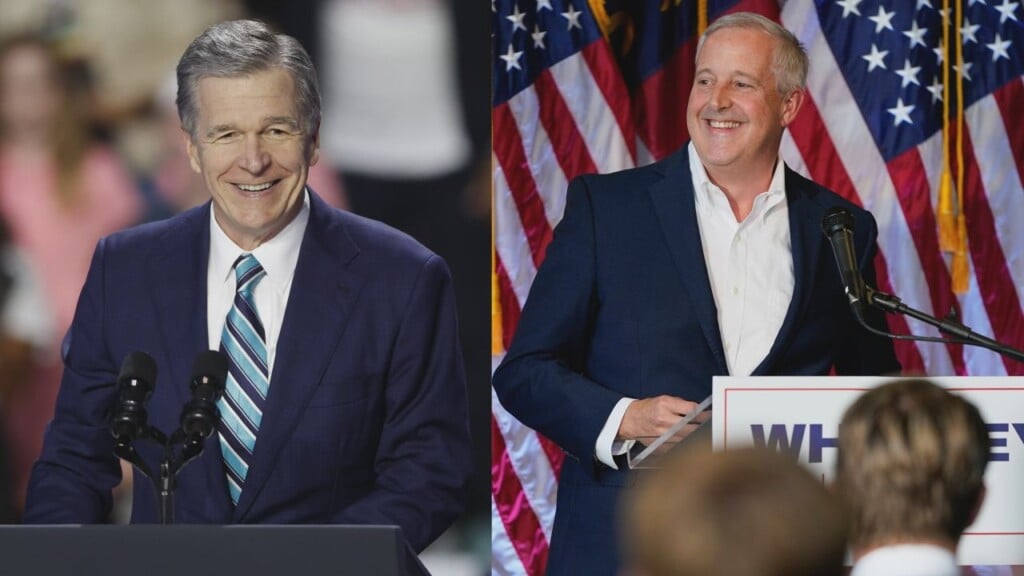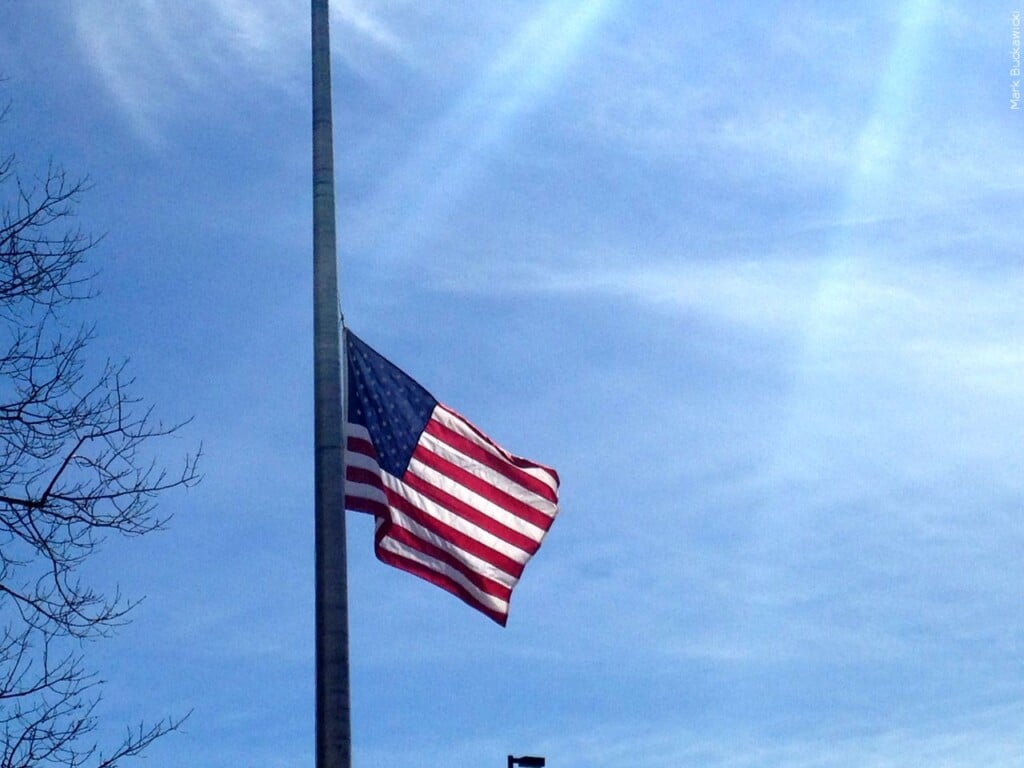Ukrainian refugee’s train stabbing death becomes early flashpoint in 2026 North Carolina Senate race

RALEIGH, NC (AP) — Republicans in North Carolina and beyond are making a concerted effort to turn the stabbing death of a Ukrainian woman on a Charlotte commuter train into a political liability for Democratic former Gov. Roy Cooper in his bid to win a key U.S. Senate race that is still more than a year away.
GOP candidate Michael Whatley has said Cooper bears “direct responsibility” for the deadly Aug. 22 attack on Iryna Zarutska because of a commission he created in June 2020 to address racial inequity in the criminal justice system. The panel’s unveiling occurred weeks following the death of George Floyd at the hands of Minneapolis police.
But Cooper’s campaign said Whatley, a recent Republican National Committee chairman, was lying about the task force. Cooper “knows North Carolinians need to be safe in their communities,” the campaign wrote in a statement, and his career has included “keeping thousands of criminals off the streets and behind bars.” It cites Cooper signing a 2023 law that toughened pretrial release rules.
The clash has sent early signals of just how heated the North Carolina Senate race will be. It already was anticipated to be a key 2026 Senate race for Democrats seeking to claim a Senate majority in next year’s midterm elections and now could be among the most expensive Senate campaigns in U.S. history.
Democrats see the popular former governor’s bid for the open North Carolina seat as one of their best pickup opportunities in a landscape that largely favors Republicans. They need four Senate seats to claim a majority.
A tragic flashpoint emerges
Both candidates have expressed sorrow over the death of the 23-year-old Zarutska, whose horrific attack was caught on camera. But public outrage that suspect Decarlos Brown Jr. had been previously arrested more than a dozen times and had been recently released on a charge without bond prompted accusations by Whatley and allies that Cooper has pushed soft-on-crime policies.
“It’s pretty simple: A vote for Roy Cooper is a vote for more crime, more violence, more criminals,” Whatley said in the first days after the release of the surveillance video.
Cooper pushed back hard.
“I’ve been Attorney General and Governor, dedicating my career to putting violent criminals behind bars and keeping them there,” Cooper, who was the state attorney general for 16 years before eight as governor, wrote on X. In turn, he accused Whatley, also a recent state GOP chairman whom President Donald Trump encouraged to enter the race, of looking to take advantage of Zarutska’s death.
“Only a cynical DC insider would think it’s acceptable to use her death for political points,” he said on X.
More Republicans soon chimed in on social media, including Vice President JD Vance and Trump, who posted that “her blood is on the hands of the Democrats” and named Cooper specifically.
The killing, which fit neatly into Trump’s tough-on-crime agenda in big cities, gave Whatley a clear opening, said Chris Cooper, a political science professor at Western Carolina University.
“People don’t know who he is. He doesn’t have high name recognition,” said Cooper, who is not related to the former governor. “So he is trying to define himself for North Carolinians, and he’s trying to redefine Roy Cooper.”
2 high-profile candidates square off
Both Cooper and Whatley got in the race this summer, within weeks of GOP Sen. Thom Tillis announcing that he would not seek reelection. Cooper had always been considered a potential Senate candidate in 2026. Whatley announced when Lara Trump, the president’s daughter-in-law, declined to jump in.
With no other high-profile candidates currently in the race, the parties’ primaries seem unlikely to head off a Cooper-Whatley general election battle.
Some pundits think spending in next year’s race could reach $1 billion, blowing past the $515.5 million spent overall on a U.S. Senate race in Georgia in 2020 won by Democrat Jon Ossoff in a runoff, according to data from Open Secrets, which tracks political spending.
The campaign pits Cooper, a proven winner for Democrats in a Southern state, against first-time candidate Whatley. Whatley’s deep loyalty to Trump — who won the state’s electoral votes all three times he ran for president — and fundraising skills make him a formidable opponent in the closely divided state.
Suspect’s criminal history and release ignite criticism
Brown, who was indicted for first-degree murder this month in state criminal court, also faces a federal charge in Zarutska’s death. He could face the death penalty if convicted. Calls to the Mecklenburg County public defender’s office, seeking someone who could comment on Brown’s behalf, previously were unanswered.
A magistrate earlier this year allowed Brown, who in September 2020 completed more than five years in prison for robbery with a dangerous weapon, to be released without bond on a nonviolent misdemeanor charge, according to court records. Brown was ordered to undergo a mental health evaluation after his latest arrest.
The panel then-Gov. Cooper established in June 2020, the Task Force for Racial Equity in Criminal Justice, offered dozens of recommendations, including eliminating the need for people accused of most misdemeanors to post a cash bond unless doing so would endanger someone else.
But Cooper wasn’t a task force member, and the panel had no authority to enact cash bail recommendations or release people from prison. And the task force’s December 2020 recommendations — most of which were ignored by Republican lawmakers — were released after Brown left prison.
State Senate leader Phil Berger said at a news conference with Whatley earlier this month that task force recommendations reflected “an attitude on criminal justice” that informs magistrates to make bond decisions like the one Brown received. The GOP-controlled General Assembly is expected to take up criminal justice reform this week.
Whatley also criticized Cooper for a 2021 lawsuit settlement that required his administration to release 3,500 offenders within state custody over several months. The state NAACP, the American Civil Liberties Union of North Carolina and others had sued to address prison conditions during the COVID-19 pandemic.
Cooper pushes back on canceled federal grants
Fighting back, Cooper’s campaign has tried to link Whatley to April’s cancellation of hundreds of U.S. Department of Justice grants for programs supporting violence reduction and crime victims. Whatley has expressed broad support for government efficiency efforts in the Trump administration, although there’s nothing to indicate he actively backed these cancellations.
Chris Cooper, the Western Carolina professor, said Whatley’s strategy on crime is likely to be repeated — attempting to connect any order or action in Roy Cooper’s long career to a negative outcome.
It should make for a long, drawn-out contest.
“We live in a time of essentially a constant campaign,” Chris Cooper said. “And if anything, the temperature is only going to rise between now and next November.”




